The announcement “Tsuyo Manufacturing Signs LOI with Government of Karnataka” has sparked fresh excitement in India’s EV landscape. Revealed at the Bengaluru Tech Summit 2025, this landmark move hints at a breakthrough that could redefine how the country builds and tests heavy-duty commercial EVs. With plans for a cutting-edge powertrain facility and dedicated testing track in Dharwad, the partnership opens the door to innovation, jobs, and a new era of sustainable mobility—leaving readers eager to know what comes next.
Tsuyo, a Delhi-based startup specialising in electric powertrain solutions, plans to invest ₹250 crore in the upcoming facility. This strategic investment is expected to generate around 700 jobs, supporting both direct and indirect employment in the region. The initiative is aligned with Karnataka’s Local Economy Accelerator Program (LEAP), which focuses on boosting indigenous manufacturing and technology-driven economic growth.
The Dharwad facility will focus on producing heavy-duty EV powertrain systems for commercial and industrial applications. The plant is planned to support a wide production range—from 0.5 kW to 250 kW, with a future expansion capability of up to 600 kW in collaboration with CETL and LvKON. Key components expected to be manufactured include:
- Advanced electric motors (IPMSM, ACIM, SRM, SynRM, Axial Flux)
- E-drives
- E-axles & automatic transmissions
- Integrated 2-in-1 and 3-in-1 powertrain systems
- Complete powertrain assemblies for commercial EVs
In addition to manufacturing, Tsuyo will build a comprehensive test track designed to support real-world validation and field testing of electric buses, trucks, mining vehicles, and other commercial EVs. This will enable the development of powertrain systems tailored specifically to Indian operating conditions, addressing a critical need in the commercial EV sector.

The project aims to reduce India’s reliance on imported powertrain systems, strengthen domestic supply chains, and accelerate the growth of heavy commercial EV adoption across the country. Tsuyo’s CEO, Vijay Kumar, highlighted the significance of the initiative, stating that the facility will “redefine powertrain excellence” while contributing to India’s transition toward sustainable, locally manufactured mobility solutions.
Karnataka’s IT & Biotechnology Minister, Priyank Kharge, welcomed the investment, noting that Tsuyo’s decision reinforces the state’s leadership in innovation and its industry-friendly policies. He emphasised that the project will not only create quality jobs in North Karnataka but also attract more EV players to the state, strengthening the broader green mobility ecosystem.
With this LOI, Tsuyo Manufacturing and the Karnataka government are set to play a pivotal role in shaping India’s commercial EV landscape and advancing clean mobility for the future.
Related Articles:-





